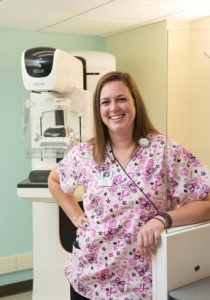Local “rad tech” finds fulfillment aiding women as mammographer
Eagle Tribune
October 14, 2016

Jessica Michaud is an alumna of NECC’s radiologic technology program and Regis College’s bachelor completion program.
Each year, according to the U.S. Department of Health and Human Services, more than 39 million mammograms are performed to rule out breast cancer. Radiologic technologists certified in mammography are on the frontlines administering this diagnostic and screening tool.
Jessica Michaud, a 2015 graduate of Northern Essex Community College’s Radiologic Technology Associate of Science Degree program, is one of these technologists. After graduating from NECC, she transferred right into Regis College’s Bachelor of Science completion program. She earned her BS and certification as a mammographer, someone who is trained to use ionizing radiation to create images of the breast for breast cancer screening and diagnostic purposes in hospitals, clinics, labs, and outpatient centers.
The 29-year-old Seabrook, New Hampshire, resident says becoming certified in mammography was a natural extension of her education in radiologic technology. On average she performs 12 to 15 mammograms a day as a mammographer at Lawrence General Hospital.
“I really like radiology because you know what you are looking at. You really see what you are trying to examine. If it’s a bone you are trying to examine. You get a clear image of the bone. The same goes for the breast.”
She first became interested in mammography when she was fulfilling her clinical rotations.
“Northern Essex prepared me well to be a rad tech. It taught me everything I need to know to take xrays, but it also introduced me to other modalities like mammography,” she said.
While observing mammograms being performed during her clinical site visits, Michaud said she saw the personal side of the job. She knew then she would further her education after Northern Essex to be certified as a mammographer.
“I saw the personal connections the tech made with the patient. I liked that. We tend to follow the patient from the initial mammogram. We may take additional images, schedule a biopsy, take more images after the biopsy, and even more following surgery. We follow the patient all the way through the process and then on the follow up 6 or 12 months out.”
Michaud says her work is rewarding.
“I don’t just have a job,” she said. “I have a career where you can grow.”
Individuals interested in careers as radiologic technologists can attend information sessions planned for October 3, November 7, and December 5. Each session begins at 4 p.m. in the Dimitry Building on Franklin St., in Lawrence.
Associate degree candidates learn how to accurately position patients for a variety of radiologic procedures. They are taught radiation protection measures for themselves, their patients and other health care professionals while properly setting the technical factors to create diagnostic images. They also learn how to care for patients and interact with other health care professionals.
Graduates can work as entry-level radiologic technologists in hospitals, clinics, doctor’s offices, or with mobile radiography companies. Through on-the-job-training or additional education they can work in the specialty areas like mammography or Magnetic Resonance Imaging (MRI), Computed Tomography (CT), Vascular Interventional Technology (VIT).
Job prospects are very good and are expected to continue to grow. According to the Bureau of Labor Statistics (BLS) the demand for radiologic and MRI technologists is expected to increase by nine percent between now and 2024. This is faster than the average of all occupations. As the population grows older, there will be an increase in medical conditions that require imaging as a tool for making diagnoses.
According to the BLS the median annual wage for radiologic and MRI technologists was $58,120 in May 2015.







